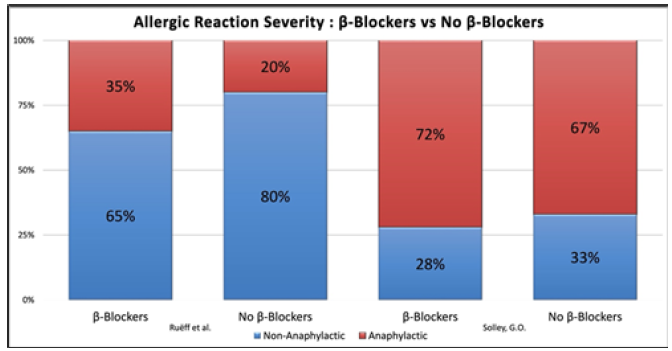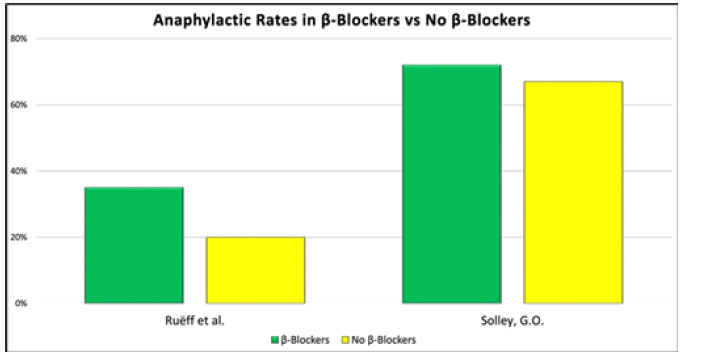Short communication 
 Creative Commons, CC-BY
Creative Commons, CC-BY
Use of Beta-Blockers in Patients with History of Bee Sting Anaphylaxis
*Corresponding author: Kamil Salam, Internal Medicine, Wright State University Boonshoft School of Medicine, USA.
Received: July 04, 2024; Published: July 10, 2024
DOI: 10.34297/AJBSR.2024.23.003053
Abstract
Anaphylactic reactions to Hymenoptera stings account for nearly 30% of all animal-related deaths in the U.S. The aim of our study was to investigate the impact of beta-blockers on the severity of anaphylactic reactions. A comprehensive literature review, encompassing 3567 patients, reveals a 37% anaphylaxis rate among beta-blocker users following Hymenoptera stings. Notably, patients on beta-blockers exhibit higher rates of severe reactions compared to non-users. Although limited by data constraints, our findings suggest an increased risk of severe and potentially lethal outcomes in beta-blocker users after bee stings. Clinicians should consider alternative therapies for individuals with a history of anaphylaxis to bee stings and contemplate 'accelerated' immunotherapy. Further research is needed to refine risk quantification and guide clinical decision-making.
Keywords: Hymenoptera Venom, Beta-Blockers, Anaphylaxis, Hypersensitivity, Immunotherapy, Medication Safety
Abbreviations: U.S: United States; β-blockers: Beta-Blockers.
Introduction
Almost 30% of all animals related deaths in Americans are attributable to anaphylactic reactions to Hymenoptera (hornets, wasps, and bees) stings. Beta-blockers are one of the most prescribed classes of medication in the U.S., with tens of millions of Americans on beta-blocker therapy. Epinephrine is a cornerstone in the emergent management of such reactions, and beta-blockers may attenuate the effectiveness of epinephrine and the body’s endogenous adrenergic response in anaphylaxis [1,2].
Materials and Methods
Methods
A literature review of online databases was conducted searching the keywords Hymenoptera, anaphylaxis, bee stings, and beta-blockers. Any patients less than 18 years old, or papers with no mention of beta-blockers, were excluded. Reaction grading was standardized to the Mueller Scale, with Grades III and IV being considered anaphylactic reactions. The rates of anaphylaxis in Hymenoptera stings were compared between those patients on beta-blockers and those not on beta-blockers (Figures 1,2) (Table 1).
Results and Discussion
Results
A total of 3567 reported patients were included in the analysis, 1688 of which suffered anaphylactic reactions (Mueller Scale Grade III or IV). Patients on beta-blockers had a 37% rate of anaphylactic reactions following Hymenoptera stings. Two of the largest studies individually showed that patients on beta-blockers had a higher rate of anaphylactic reactions following Hymenoptera stings compared to those patients not on beta-blocker therapy (35% vs. 20% and 72% vs. 67%).

Figure 1: Comparison of Allergic Reaction Severity in Patients on β-Blockers vs. Non-β-Blocker Therapy Following Hymenoptera Stings. The two largest studies demonstrated higher rates of severe (Mueller Grade III or IV) reactions in patients on β-blocker therapy.

Figure 2: Anaphylactic Reaction Rates in patients on β-Blockers vs. No β-Blockers. Of the total 3567 patients, 1688 suffered anaphylactic reactions (Mueller Grade III or IV). Patients on β-blocker therapy had higher rates of anaphylaxis after Hymenoptera stings.
Discussion
While statistical analysis was restricted by the limited nature and heterogenicity of the data available, this data indicates that individuals on beta-blockers are at an increased risk of suffering severe and potentially lethal reactions after bee stings.
Conclusion
While further research is needed to better quantify these risks, clinicians should consider alternatives to beta-blocker therapy in individuals with a known anaphylactic reaction to bee stings given the increased risk of severe and potentially lethal outcomes if exposed to Hymenoptera venom. Such individuals should be evaluated on a case-by-case basis and if beta-blocker therapy is deemed essential, then ‘accelerated’ immunotherapy should be considered.
Acknowledgements
None
Conflict of Interest
The authors have no conflict of interest.
References
- Franziska Ruëff, Bernhard Przybilla, Maria Beatrice Biló, Ulrich Müller, Fabian Scheipl, et al. (2009) Predictors of severe systemic anaphylactic reactions in patients with Hymenoptera venom allergy: importance of baseline serum tryptase-a study of the European Academy of Allergology and Clinical Immunology Interest Group on Insect Venom Hypersensitivity. J Allergy Clin Immunol 124(5): 1047-1054.
- Solley GO (2004) Stinging and biting insect allergy: an Australian experience. Ann Allergy Asthma Immunol 93(6): 532-537.




 We use cookies to ensure you get the best experience on our website.
We use cookies to ensure you get the best experience on our website.